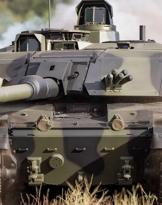When the Americans captured Fallujah, in April of 2004, the city was under the control of al-Qaida, considered the precursor of the Islamic State. This time, however, the Americans will not have a major role in the attack, which will be carried by US-trained Shiite militias. Ironically, many of them, in the 2004, fought precisely against American forces during the US occupation of Iraq.
According to the Iraqi Defense Ministry, loyalist troops surrounded the city. It will certainly not be a walk and this is what Americans know most of all. In the 2004, the marines took six months to conquer the city in two different assaults. What passed into history as the Second Battle of Fallujah ended in December of the 2004. The Americans lost 100 soldiers, while the city was nearly razed to the ground by thousands of heavy artillery blows and hundreds of missiles. The rebels lost 1500 men.
Just yesterday, in a statement made on state television, the Iraqis confirmed the attack after "six weeks of bombing". The Islamic State, in the same period, counterattacked the positions of the regular army with five car bombs and making small skirmishes.
Fallujah, since the beginning of the American occupation, has been the heart of the Sunni insurgency, first against the American occupation and then against the Shia-led government in Baghdad. The Sunni tribes of the province of al Anbar were the first to resist the American occupation.
Abu Musab al Zarqawi, the (deceased) extremist who founded al-Qaida in Iraq, had already developed a dense supply network and succeeded: he transfigured Fallujah into a death trap for Blackwater contractors and regular forces .
Fallujah has been under the control of the Islamic State since January of the 2014. The attack, according to the Iraqi government, will be conducted by Shiite militias under the supervision of the Iranian Revolutionary Guard Corps.
Historically, Shiites are hostile towards American Muslims and Sunnis: this could raise possible sectarian retaliation and the end of the delicate relations between the Shiite government of Baghdad and the Sunni tribes that dominate the vast areas of Iraq currently under the control of the Islamic state.
According to the central government, the Sunni tribal militiamen and Anbar police officers will participate in the attack. This force will join the government-trained XNUMX Sunni tribals, although this number may not be realistic. Finally, heavy artillery operates north of Fallujah.
The defense of the city can count on the sympathy of thousands of Sunnis and a fixed garrison of at least ten thousand ISIS men.
The Pentagon had sharply criticized this offensive, claiming instead the reconquest of Ramadi, lost last May and poorly defended by fundamentalists. The Iraqi government, however, has decided to move its forces to the reconquest of Fallujah, which is just 40 miles from the capital.
Franco Iacch
(in the photo an M1A1 Abrams of the Marine during the siege of the 2004 - source US DoD)












